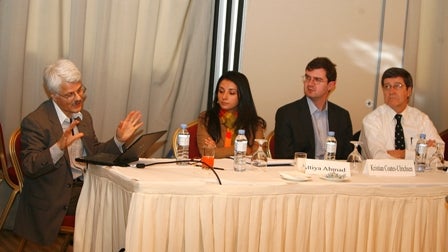Focused Discussions, Race & Society, Regional Studies
Political Economy of the Gulf Working Group I

On January 23–24, 2010, CIRS held the first of its “Political Economy of the Gulf” working group meetings. The “Political Economy of the Gulf” is a CIRS research initiative that examines key aspects of the Gulf’s contemporary economic and political situations and the region’s long-term transition from an oil-based economy to a knowledge-based one. Ten prominent Gulf specialists with expertise in various aspects of the Gulf’s political economy participated.
One of the most significant aspects of the Gulf’s political economy is the prominence of so-called rentier states. Working group participants considered the relationship between rentier economies and the development of democratic models of governance. In extreme cases, rentierism reduces political participation, but consequently leads to regime stabilization.
The role of Sovereign Wealth Funds (SWF) in Gulf economies has received much attention. Unfortunately, as participants noted, data regarding the exact size of SWFs in GCC states is insufficient, unreliable, and largely speculative. Gulf states’ SWFs are used for general long-term investments that follow international indexes; for smaller strategic investments into specific projects such as bauxite mines and technology companies; or for investing in tools to develop local industries.
The working group also considered Islamic banking systems and how they fit within contemporary Gulf states’ overall financial infrastructures and capital markets. Particularly, the differences between Sunni and Shi’a Islamic banking principles in the GCC states and Iran were examined. In either case, Islamic banking has become a popular and profitable business strategy for Gulf countries.
One presenter assessed the prospects of a monetary union among GCC states. Some economic consequences of such a merger include the removal of exchange rates, increased trade among members, and improved international credibility for GCC financial markets. A successful monetary union would also enhance the Gulf’s international bargaining power. However, the group also questioned the viability of a GCC monetary union in light of pressure exerted from a variety of external forces.
A general theme running throughout the meeting was the diversification of Gulf state economies, with a special emphasis on the move away from oil and gas toward knowledge-based economies with thriving financial centers based on management of assets. Educational institutions and intellectual property industries are of particular importance to this new economic philosophy and infrastructure.
Also under examination during the working group meeting was the rise and fall of the “Dubai Model” of diversification, and how this differed from past strategies that the state has employed. Despite the recent problems that the government of UAE has experienced, the general understanding, both locally and internationally, is that this is a temporary hiccup in Dubai’s life cycle. Although devoid of oil wells, Dubai has managed to attract oil wealth and carve out a niche for itself as a fully-functional financial hub.
Participants identified demographic and economic circumstances that will likely affect the Gulf’s political economy in the future. The consequences of differences between Iran’s population pyramid and those of the Gulf for future economic development were considered. Also, drawing from trade statistics and market data, some participants assessed the prospects of trade integration among the states of the GCC and how this will affect their trade relations with the rest of the world. Free Trade Zones within Gulf economies were considered especially significant in this regard.
The research initiative is expected to run for a year with at least one more meeting taking place in 2010 at which the participants will present papers. Eventually, these papers will be revised and published as an edited volume titled The Political Economy of the Persian Gulf (Columbia University Press/Hurst, 2012).
- Read more about this research initiative
Participants and Discussants include:
Alexis Antoniades, Georgetown University School of Foreign Service in QatarZahra Babar, Georgetown University School of Foreign Service in QatarKai-Henrik Barth, Georgetown University School of Foreign Service in QatarSven Behrendt, Carnegie Middle East Center in BeirutMary Breeding, Georgetown University, Washington, DCJohn T. Crist, Georgetown University School of Foreign Service in QatarChristopher Davidson, Durham UniversityNada Eissa, Georgetown University School of Foreign Service in QatarSteffen Hertog, Sciences PoMehran Kamrava, Georgetown University School of Foreign Service in QatarMassoud Karshenas, School of Oriental and African Studies, University of LondonSuzi Mirgani, Georgetown University School of Foreign Service in QatarHamid Naficy, Northwestern University in QatarDjavad Salehi-Isfahani, Virginia TechGanesh Seshan, Georgetown University School of Foreign Service in QatarJean-François Seznec, Georgetown University, Washington, DCKristian Coates Ulrichsen, London School of EconomicsDaniel Westbrook, Georgetown University School of Foreign Service in QatarRodney Wilson, Durham University and Qatar Foundation’s Qatar Faculty of Islamic StudiesNicola Zaniboni, Georgetown University School of Foreign Service in Qatar
Article by Suzi Mirgani, CIRS Publications Coordinator